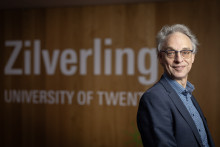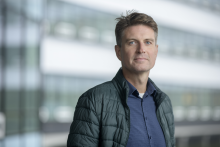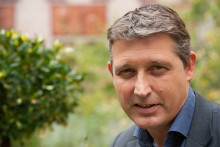'The EEMCS faculty has a plan ready that we will start working on immediately this year. Among other things, we are investigating the establishment of a new study. This programme is all about AI and data science. If all goes well, we may be able to offer such a training as early as 2026. To explore and investigate all the options, these are crucial months until next summer.'
'It's exciting how many first-years come in in September'
'In addition to the ambitious plans, we also face challenges. Retaining enough students is one of them. Every year in September, it is exciting exactly how many first-years come in. That is why we will pay even more attention to reaching our target group in 2025.'
In the first week of January, there was no New Year's speech on the programme at the EEMCS faculty, because we had already held a Christmas meeting two weeks earlier. I reflected on the past year, but my gaze certainly went to 2025 as well. In doing so, I asked myself and all those present whether we are still doing the right things. Is the current educational offer and the chosen form still appropriate to social demand? Are the courses and lectures relevant and good enough or should we take a closer look at them? If so, what changes in education are needed? And can we organize support more efficiently? This year we are looking for answers to those questions. We have to dare to ask these questions, we can't continue on the current course.'
'We want to offer AI specialisations at the bachelor's and master's level. This can also mean that we offer AI as a 'track' within an existing programme. To distinguish ourselves from other universities, we map out which AI studies already exist. Then we look at the content of subjects that we can teach. We also investigate the impact and addition of the track on our society. When you create something new, it is always at the expense of something else. That may mean that certain electives will disappear.'
'We notice that the content of our technical courses is not always clear to prospective students. For example, they do not have a good idea of the career opportunities after completing the study. So that is a challenge for us, to get that picture more clear.'
'When it comes to mathematics, many people think of arithmetic and complicated formulas. That is a misconception, because an engineering student can be of great value in the future, for example in healthcare. Mathematics also plays an important role in the field of climate and energy. That is why, for example, in the coming six months, we will be looking at which social media channels we will use more intensively to inform and attract new students. In this way, we reach our target group faster and easier. We hope it will bear fruit and lead to a higher student intake.'
'Because of the cutbacks, dark clouds hang over the UT. EEMCS faculty is still on the right side financially, and we don't expect any problems in 2025. For us, the cutbacks mean that we use fewer student assistants and travel abroad less.'
'Focusing on innovation remains important, despite the cutbacks'
'The year 2026, on the other hand, will be a different story. We are already preparing for that. For example, do we replace someone who is retiring or do we divide the work among ourselves? These are issues that are on the table and that we will have to decide on later. Nevertheless, focusing on innovation remains an important element in our policy. Even in times of budget cuts.'
'Despite the cutbacks, there are plenty of opportunities for the UT at university level. We can make a move towards the outside world. Think of more connection with companies and organizations in the Twente region. There is still enough space and we have to make good use of it to grow further. The potential in this region is great, and we as UT can play an important shaping role in this.'
'I go one step further geographically. The European idea is close to my heart. That's why I think we shouldn't just train students for the regional or national labour market, but we should prepare them for a role in Europe.'






